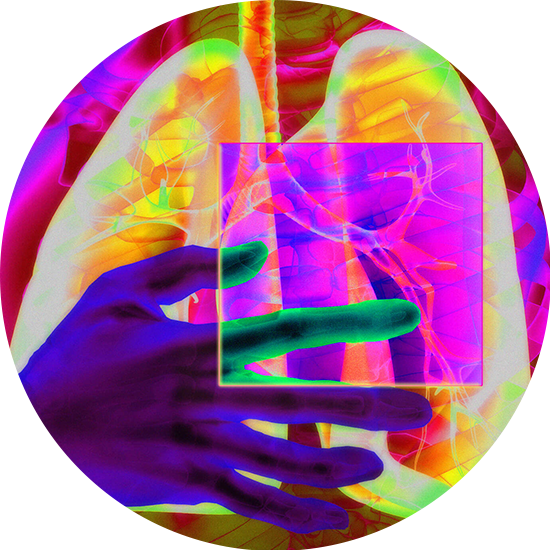
Emotional Wellbeing
Courage doesn’t always roar. Sometimes courage is the quiet voice at the end of the day saying, ‘I will try again tomorrow.’” – Mary Anne Radmacher
Like yin and yang, your physical and emotional wellbeing are intimately related to each other. In addition to the physical impact on your body, living with a chronic illness can have a profound impact on your emotional health and wellbeing, as well as your overall quality of life—and vice versa. This is especially true when the primary symptom of that that illness is the inability to breathe. Conversely, emotional factors such as stress, anxiety, and depression can have a profound impact on your physical health and wellbeing. In many cases, these negative emotions can increase your symptoms or even cause disease.
The good news is that like many of the relationships we discuss in this book, the reverse can also be true. Emotions such as peace, love, and happiness (yes, my parents, Mel and Sherry were hippies) can have a profoundly positive impact on your physical wellbeing, and in many cases, help reduce your symptoms and minimize their impact on your life and prevent disease.
“Whether you think you can or think you can’t—you’re right.” – Henry Ford
I often encounter people during some of the worst times of their lives. Perhaps they have been newly diagnosed or maybe they are experiencing an exacerbation or progression of their existing disease or some other setback in their lives. This can be difficult to cope with from both a physical and emotional perspective. After all, not being able to breathe can be incredibly stressful, anxiety provoking, and depressing.
Life with a chronic illness definitely can (and will) have its ups and downs. But, guess what. So can life without a chronic illness. Ups and downs are a natural part of being human. Regardless of who you are, some days will shine brighter than others and other days, things will get dark. Sometimes, everything in your life will seem perfect and sometimes, well, quite simply, they will suck. The key is not to get stuck in “Suckville.”
“When we are no longer able to change a situation, we are challenged to change ourselves.” – Victor Frankl
Please don’t think that I am minimizing your situation. I am not. I also understand that what I am saying is easier said than done and sometimes, no matter what you do, it can be hard to dig yourself out of that hole. That’s when it’s time to ask for help, whether it be from your doctor or other health care professional, friends or family members, clergyman or clergywoman, dog, cat, bird; or whomever or whatever it may be that helps pick you up when you’re down.
This chapter was particularly challenging for me. I kept going back and forth between a physiology-based, science-intensive chapter, a pop-psychology feel-good pick-me-upper, and a locker room halftime speech. In the end, I decided to incorporate a little of each, with the purpose of motivating you, giving you some helpful tips and sending you back out on the field, feeling ready to kick some butt.
I have also decided to share some of my favorite quotes with you; particularly those in which, I, myself find comfort or motivation or that otherwise inspire me when I am being faced with my own personal challenges, of which there have been many. Hopefully, you will find them helpful as well. If not, feel free to cross mine out and write in your own.
“The only constant in life is change.” – Greek Philosopher, Heraclitus of Ephesus
The Greek philosopher, Heraclitus of Ephesus, lived from 535 BC-475 BC and is best known for his doctrine on change being central to the universe. This goes hand in hand with “this too, shall pass,” attributed to either Persian Sufi poets or King Solomon of the bible depending on your source.
“This, too, shall pass.” – Persian Sufi Poets or King Solomon
Both of these quotes remind us that change is inevitable and that we should not find it surprising when things in our lives shift, be it for better or for worse. In fact, we should be more surprised if and when things stay the same. Another piece of advice to be gleaned from those messages is to try to embrace the change, roll with the punches, soak in life’s beautiful moments and push through the challenges because nothing lasts forever; again, for better or for worse.
As always, this chapter is not a substitute for a personal consultation with your doctor, mental health counselor or any other health care professional. With that in mind, let’s talk about stress, ba-by!

Stress, Anxiety and Depression
For most of us, the word “stress,” is synonymous with words like pressure, anxiety, depression, loneliness or one of many other negative emotions. However, contrary to what many people believe, not all stress is bad. In fact, stress can serve as a powerful motivator in our lives.
Eustress (i.e. good stress) occurs when we are motivated in a positive way in response to a certain stressor. This positive response allows us to focus our attention and perform better under pressure or to deal with a challenging or dangerous situation. In contrast, distress (i.e. bad stress) is what most people typically think of simply as “stress.” Left unchecked, this negative stress can be overwhelming and lead to a whole host of physical and emotional problems.
Everyone experiences some degree of stress in their lives that will fluctuate in terms of intensity and duration.
While the severity of these negative emotions will vary from person to person, repeated or prolonged exposure to stress; or even brief periods of very high levels of stress can be a major threat to your happiness and your health. Prolonged or repeated feelings of stress can contribute to conditions like anxiety and depression, which can become chronic problems in themselves and lead to all kinds of negative physical, emotional, mental and behavioral consequences.
For those already living with a major health problem like respiratory or cardiovascular disease, long-term stress can have especially severe consequences if the person doesn’t recognize the problem and take steps to address it. Let’s take a look at some of the potential manifestations of stress, as well as some things you can do about them. There is likely some overlap among categories, which can make dealing with your emotions particularly challenging, especially when you are already living with a chronic illness.
As an example, having COPD, IPF or PH can unquestionably cause you to experience low energy or fatigue. However, stress, anxiety, or depression can also cause fatigue, and these physical and emotional manifestations can play off of each other, which is even more of a reason to address these issues head on. You don’t have to make all of these changes at once. However, a little effort in each area can go a long way towards improving your physical health, emotional wellbeing and quality of life.
Here are some of the more common physical, emotional, cognitive and behavioral manifestations of stress, anxiety and depression:
Physical Manifestations
Although it can be tempting to blame your cardiopulmonary condition for every physical symptom you experience; stress, anxiety, or depression, can also be contributing factors, if not the cause. In addition, because negative emotions and physical symptoms often go hand-in-hand, identifying whether your emotional state is the cause or the effect can quickly turn into a classic case of “which came first: the chicken or the egg.” As an example, are you experiencing shortness of breath and fatigue due to your respiratory condition or because of stress, anxiety or depression? Or is it a combination of factors? This is where an open conversation with your physician and a comprehensive physical examination can be useful. Some of the more common physical symptoms that can be associated with stress, anxiety and depression include the following:
- Low energy, fatigue
- Dry mouth or difficulty swallowing
- Headaches, jaw clenching or teeth grinding
- Body aches and pains or increased muscle tension
- Chest pain, rapid heartbeat, or palpitations
- Nervousness, shaking, cold, clammy hands/feet
- Upset stomach, diarrhea, constipation, nausea, or dizziness
- Insomnia or other sleep disturbances
- Frequent colds or infections
- Loss of sexual desire, drive, or ability
Emotional Manifestations
Emotional signs of stress can be harder to quantify since each person has a different threshold for stress, anxiety, depression and other negative emotions. Sometimes, these emotions may be less noticeable or for some people, may seem like a “normal” part of your everyday life but I can assure you, they are not. Some of the more common emotional symptoms associated with stress, anxiety and depression include the following:
- Anxiety
- Irritability, anger, agitation, or hostility
- Lack of motivation or focus
- Depression, generalized sadness
- Feeling overwhelmed, loss of control, or the need to control
- Restlessness, difficulty relaxing or quieting your mind
- Avoiding others, loneliness, or isolation
- Low self-esteem or feelings of worthlessness
Cognitive Manifestations
Like emotional signs of stress, mental or cognitive difficulties can often be hard to pinpoint. While external factors often contribute to negative emotions, our mental state both affects and is affected by recurrent feelings of stress, anxiety and depression. In other words, stress can be caused by internal factors such as negative self-talk, pessimism, and perfectionism, among others. However, these factors can also be reinforced by constant stress, anxiety, and depression creating a persistent cycle of negativity. Some of the more common mental or cognitive symptoms associated with stress, anxiety and depression include the following:
- Constant worrying
- Anxious, racing thoughts
- Memory problems, forgetfulness and disorganization
- Inability to focus, concentrate
- Poor judgment
- Pessimism or seeing only the negative
Behavioral Manifestations
Finally, stress can also trigger changes in your personal preferences, habits and everyday activities. Friends or family members may notice or comment on your new or uncharacteristic behavior. Some of the more common behavioral symptoms associated with stress, anxiety and depression include the following:
- Anger or emotional outbursts
- Nervous behaviors, nail-biting, fidgeting, pacing
- Abusing alcohol, drugs, or tobacco
- Changes in appetite, overeating or not eating enough
- Procrastination, neglecting responsibilities
- Sleeping too much or too little
- Exercising less often
- Social withdrawal
What Can We Do?
According to British philosopher, Alan Watts, “By replacing fear of the unknown with curiosity, we open ourselves up to an infinite stream of possibility. We can let fear rule our lives, or we can become childlike with curiosity, pushing our boundaries, leaping out of our comfort zones, and accepting what life puts before us.” For our purposes, I take this quote to mean that we can’t alleviate stress-related symptoms unless we address their underlying cause. With this in mind, here are some ideas of ways to reduce your stress level.
Get Educated!
Fear of the unknown can very often worsen or intensify whatever situation you are dealing with. When it comes to finding out about your medical condition, everybody is different and has different levels of “wanting to know.” For me, personally, it is almost always better to find out as much information as I can, and what I can do to deal with the problem head-on.
This can be especially important for people living with a chronic illness. By learning as much as you can about your disease, its associated symptom, and available treatments, you will be in a better position to make decisions regarding your care and your life. In addition, this understanding can help you gain a greater sense of control, reduce your day-to-day stress, and contribute to your overall sense of wellbeing.

“Knowledge is the antidote to fear.” – Ralph Waldo Emerson
Get Support!
Humans are, by nature, social creatures and we know that social support plays a huge role in shaping our emotional health and enhancing our quality of life. Chronic harmful emotions like stress, anxiety and depression can feel exponentially more oppressive when we are dealing with them in isolation. We all have busy lives, but spending time with loved ones can significantly improve your emotional state, mental health, and physical wellbeing.
That being said, while the support of family and friends is extremely important, this can sometimes present its own challenges. As an example, you may not feel comfortable sharing certain aspects of your disease with them. You may feel like they will not be able to understand your situation, or you may not want to burden them with your concerns.
This is where a support group can be a tremendous help. By belonging to a group in which, people have the same or similar condition, you will come to realize that you
are not alone. You will have the opportunity to interact with people who are going through similar struggles, and who knows? You may even be able to serve as a resource to someone else in need. Whether in-person, by telephone, or online, support groups can help you learn from the experience of others and share your own in return.
Work It Out!
Making exercise a priority can elevate your mood, boost your physical, mental and emotional health, help lower stress, and reduce feelings of anxiety and depression. Regular exercise can also reduce blood pressure and further elevate your mood through the release of endorphins, our body’s natural painkillers and mood enhancers. Focusing on improving your health through increased activity can also give you a greater sense of control in your life.
Eat Well!
What you eat can have a tremendous impact on your mood, energy level and ability to deal with stress, anxiety, and depression. Many different factors contribute to the what, when, and why we eat, and being more conscious of these factors can help to improve your physical health and your emotional wellbeing.
To help combat negative emotions, avoid refined or processed foods, particularly foods high in simple carbohydrates, sugars, and saturated fat. Instead, eat a balanced diet with plenty of fresh vegetables and fruits, lean, high-quality proteins, and healthy fats and oils.
Similarly, avoid alcohol, which is a central nervous system depressant and limit stimulants like caffeine (e.g. coffee, teas, soda), which, in addition to making you feel jittery and potentially more short of breath, can increase your feelings of stress, anxiety, and depression.
Breathing, Meditation and Mindfulness!
Breathing exercises and meditation have been used for centuries as calming techniques. There are many ways that you can incorporate breathing, meditation, and mindfulness exercises into your life. There are specific classes in meditation and pranayama (yogic) breathing, as well as methods like Yoga, Tai Chi, or Qigong that can improve your breath control, while calming and quieting your mind. You can also take a few moments each day to sit quietly, simply focusing on your breathing while clearing your mind of distractions.
Be Kind (to yourself)!
Besides exercise, eating well, and meditation; make time to relax and treat yourself to some of the things that you enjoy and that make you feel good about yourself. Take a friend to dinner, take your dog for a walk, play with your children or grandchildren, listen to music, get a massage, manicure or pedicure, knit, needlepoint, color or paint, dance, or whatever else it is, that makes you happy.
Think Positive!
Optimism and/or pessimism can have a major impact on your physical, mental, and emotional health. I realize that maintaining a positive attitude is sometimes easier said than done, but people who have a positive attitude often have a greater ability to deal with stress. Taking steps to reframe your attitude and negative self-talk will prepare you to cope more effectively with stressful situations and to fight off anxiety and depression.
Take steps to surround yourself with positive influences. If you’re constantly being assaulted by cynical people, negativity, or rude comments; or depressing or anxiety- provoking TV shows or other media outlets, you will have a much harder time breaking the cycle of negativity.
“The most important decision is to be in a good mood.” – Voltaire
LOL!
There’s a reason why we often call laughter the best medicine. Laughter has the ability to lower our stress level, decrease anxiety, and reduce depression. Laughing can relieve both physical and emotional tension in our bodies, reducing the level of stress hormones in the blood and stimulating the release of endorphins, relieving pain and promoting healthy immune function.
Finding a way to laugh productively in stressful or depressing circumstances may seem challenging at first, but, like anything, it gets easier with practice. Make humor an intentional part of your life. In the end, the method doesn’t matter as much as trying to lighten the mood, whenever possible.
We need more kindness, more compassion, more joy, and more laughter. I definitely want to contribute to that. – Ellen DeGeneres
Seek Professional Help
Finally, if despite your best efforts, you’re still having a hard time coping with your emotions, you might consider seeking professional help. Psychiatric professionals, counselors, and religious leaders offer different types of therapies to help get you back on track. There’s no shame in asking for help when you need it and no shame in trying medication when appropriate and under the care of your physician.
Making the Change
Living with a chronic respiratory disease is not easy and can trigger negative emotions such as stress, anxiety, and depression, both in the moment and over the long-term. One of the ironies is that when we’re feeling stressed, anxious, depressed, or angry, we often engage in the exact opposite behaviors that we should. We decrease our participation in healthy activities like exercise and increase our participation in unhealthy behaviors like eating poorly or using tobacco.
Please understand that I am not minimizing your feelings or saying that it will be easy. I recognize and appreciate the gigantic emotional toll that living with a chronic illness can have on a person’s life, especially one in which shortness of breath is a primary symptom. The good news is that you do have the power to change and there are things that you can do to minimize your symptoms and improve your life.
“You’re braver than you believe and stronger than you seem, and smarter than you think.” – Christopher Robin
























